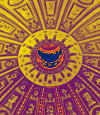



The Deus Ex Machina
Cycle
Opera in Two Acts
Libretto by Elodie Lauten with lyrics by: Melody Sumner Carnahan, Steven
Hall, Carl Karas, Rilke, Verlaine, Pascal, and the composer.
Composed: 1995-97
PRODUCTIONS
Commission and Workshop production, Soho Baroque Opera,1996
Premiere (Part I): Interpretations Series at Merkin Hall, 1997
Premiere (Part II): WNYC Live at Merkin Hall, 1998
Double CD set, 4-Tay, 1999 (Acknowledgement: Interpretations, World
Music Institute, WNYC)
Languages: English, French, Italian, German, Latin
The
cycle is a collective consciousness opera about how human beings have
the ability to progress through the experience of painful emotions to
eventually transcend them and reach the sacred realm of the spirit and
finds happiness and peace there. The subtitle of Act I is Agartha
or the Realm of Emotion and Experience. Agartha, mythical kingdom
of the gods, is a secret city symbolizing our innermost feelings. The
protagonist of the cycle is the collective soul. The Living Temple,
is about loneliness, and longing, in a primitive language of sounds
referring to the subconscious Answer is about passion, and the
mental confusion that often accompanies strong feelings; Elegy
is about the experience of loss through death, as expressed by Rilke,
in the original German; Verlaine Variations is about melancholy,
the romantic-era emotion of choice, as expressed in Clair de Lune by
Paul Verlaine, in the original French. The reason for the use of foreign
languages or broken English in this first section is because the emotions
come from deep impulses, not having fully risen to consciousness. A
flute interlude leads to a dramatic progression to Fear, followed
by Death as a Shadow, and Duel about self-destructive
impulses, with the highly emotional viola d'amore and cello duet in
between. Act I ends with The Alchemist who hopes to transform
the ordinary lead into gold, which is really a metaphor for the ascension
of the soul towards higher realms. In Act II, subtitled Akasha or
the Realm of the Unknowable, Akasha meaning the spirit element beyond
water, earth, fire and air, the soul has gone beyond the material world,
and the general mood is brighter. The harpsichord prelude is a déjà
vu of a different time. The Architect expresses oneness, the
feeling of belonging with the world, embracing it. Buddha in the
Sunlight is about the state of grace and how simple things can be
experienced as their everlasting essence. The Empress is about
fulfillment in mutual acceptance. The Fold, a musical adaptation of
the Deleuze theory, expresses awakening. The Two Infinites, adapted
from Pascal, is about inspiration, as we realize how we are connected
to the universe. The Exotic World of Speed and Beauty is a celebration
of weightlessness, a feeling of blissful levitation.
PRESS QUOTES
"Elodie Lauten’s major opus, strikingly scored for Baroque ensemble with harpsichord, with the text chanted in a style reminiscent not of minimalism but of an exotic fusion of Stravinskian chinoiserie and the 17th cantata: very beautiful."... THE VILLAGE VOICE
"A grand work that we are likely to return to again and again… timelessly beautiful… Unquestionably Lauten’s own is this fascinating combination of baroque and earlier musics with contemporary concerns." 21ST CENTURY MUSIC
"A spiritual complexity that is no stranger to the best works of the classical chamber music tradition." CHAMBER MUSIC AMERICA
"Wonderfully exciting music." OPZIJ (Netherlands)
"This work merits a major recording as soon as possible." THE SAN FRANCISCO EXAMINER
"A marvelous piece of music… performed on this CD with admirable exactitude and with the immediacy of a live recording….Although startlingly new at times I very soon recognized the rightness, the fitness of The Deus Ex Machina Cycle. I doubt that I will be alone in this recognition.…Elodie Lauten is set to become a fixture of future musical lexicons." NEW HOPE INTERNATIONAL (England)
Contact Elodie Lauten elauten@yahoo.com
Photos:
Milton Fletcher, 2007
Site
design copyright Elodie Lauten 2007